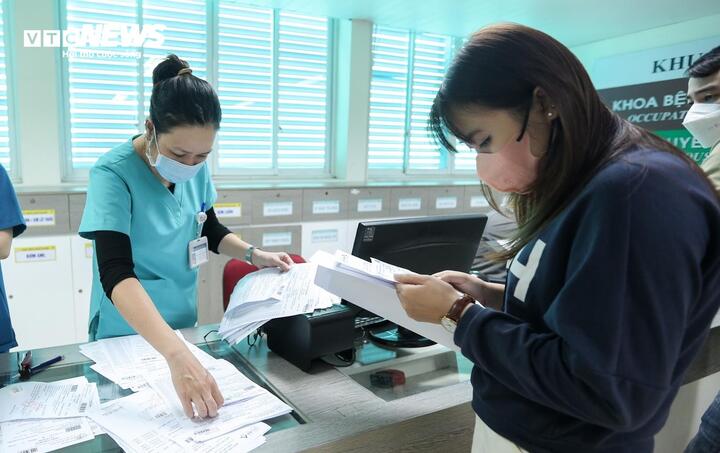According to Circular 26 recently issued by the Ministry of Health , electronic prescriptions have become mandatory, marking an important shift in drug treatment and use management.
The circular takes effect from July 1, but the regulations on electronic prescriptions will be implemented according to a roadmap. The first phase will apply to all hospitals from October 1. By January 1, 2026, this mandatory regulation will be expanded to all other medical examination and treatment facilities.
Medical staff guide patients to buy prescription drugs at a hospital in Hanoi. (Photo: Nhu Loan)
According to Mr. Vuong Anh Duong, Deputy Director of the Department of Medical Examination and Treatment Management (Ministry of Health), when electronic prescriptions are connected to the national pharmaceutical management system, all drug sales transactions will be strictly controlled.
“The regulatory agency can monitor which prescriptions are sold, which drugs are sold incorrectly,” he said. This is especially important in the context of the widespread sale of drugs without prescription, especially antibiotics, which is still widespread and has many consequences.
With electronic prescriptions, only with a valid QR code can patients buy the right medicine, in the right dosage. This data also helps detect early acts of misprescribing, drug abuse, or selling drugs without a prescription.
In addition, electronic prescriptions will integrate more personal information. Patients need to provide their personal identification number, CCCD or passport, which is a mandatory requirement on prescriptions from now on. If the identification number is declared, the system will automatically synchronize information such as gender, date of birth, and permanent address, helping to shorten prescription time and limit administrative errors.
“Prescription information will not only serve once but will be the foundation for building a unified electronic health record, serving continuous treatment and long-term health management for people,” said Mr. Duong.
To increase transparency, Circular 26 requires doctors to clearly state the number of drugs used at a time, the number of times per day, and the number of days of treatment, avoiding generalization or allowing patients to adjust the dose themselves. Regulations related to addictive drugs, psychotropic drugs, precursor drugs, etc. are also clarified, especially in cases where the patient does not finish using them or has died.
In addition, the circular also closely follows the Law on Medical Examination and Treatment 2023, requiring that prescriptions be prescribed only when absolutely necessary, for the right disease, the right person, and the right indication. “Doctors are only allowed to prescribe when absolutely necessary, avoiding all forms of abuse,” Mr. Duong emphasized.
The transition from paper to electronic prescriptions is not only a technical requirement but also represents a major step forward in the way medicines and healthcare are managed, as each prescription now leaves a “digital footprint” – uneditable, unerasable, and unsold.
Source vtcnews
View original link
Source: https://baotayninh.vn/tat-ca-benh-vien-phai-ke-don-thuoc-dien-tu-tu-01-10-a192089.html


































































































Comment (0)